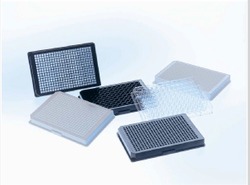Additional Details
Product Features: Non - Binding Microplates Microplates with Non-Binding Surface Properties for Biochemical Assays High quality microplates with well-defined properties are essential prerequisites for reproducible results in advanced drug discovery. In addition to format and pigmentation, determining the best microplate surface for use within a specific application is a critical factor for successful high-throughput screening. Polystyrene microplates with medium binding surfaces are commonly used for homogeneous biochemical HTS assays. Manufactured of carefully selected raw material batches, medium binding microplates demonstrate low reproducible biomolecule binding. As medium binding microplate surfaces are not physically modified, their surface characteristics are representative of pure polystyrene. However, even low amounts of biomolecular binding (e.g. DNA, RNA, proteins, peptides) can cause an undesirable increase in background, resulting in decreased signal-to-noise ratio. Greiner Bio-One's new non-binding microplate surfaces prevent unwanted non-specific binding, especially advantageous for sensitive biochemical assays. Non-binding microplates are featured in 96 and 384 well formats in black, white and clear. Including solid and µClear® film well bottoms. Non-binding surfaces from Greiner Bio-One are achieved through a stable chemical modification to covalently link functional groups with the base polystyrene polymer. Under aqueous assay conditions a hydrate layer forms, preventing dissolved biomlecules from binding to the microplate surface. As the non-binding surface is stable under common assay conditions, there is no potential for degradation or leaching and resultant assay interference. Non-binding microplates are featured in 96 and 384 well formats in black, white and clear, including solid and µ Clear film well bottoms Characteristic features of the non-binding surface area: Ultra low non-specific biomolecular binding properties (proteins, DNA, RNA) Long-term surface stability without degradation or leaching Higher assay sensitivity with reduced background

